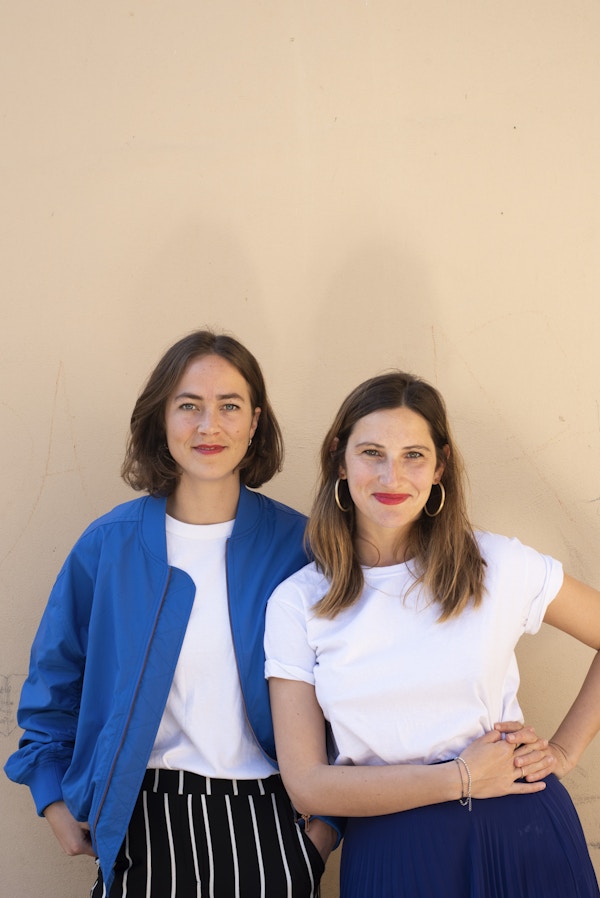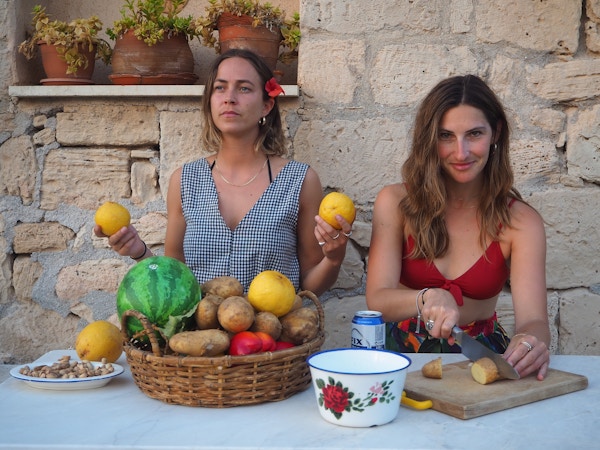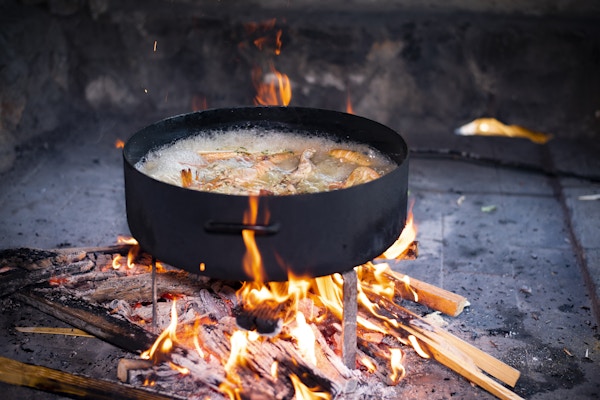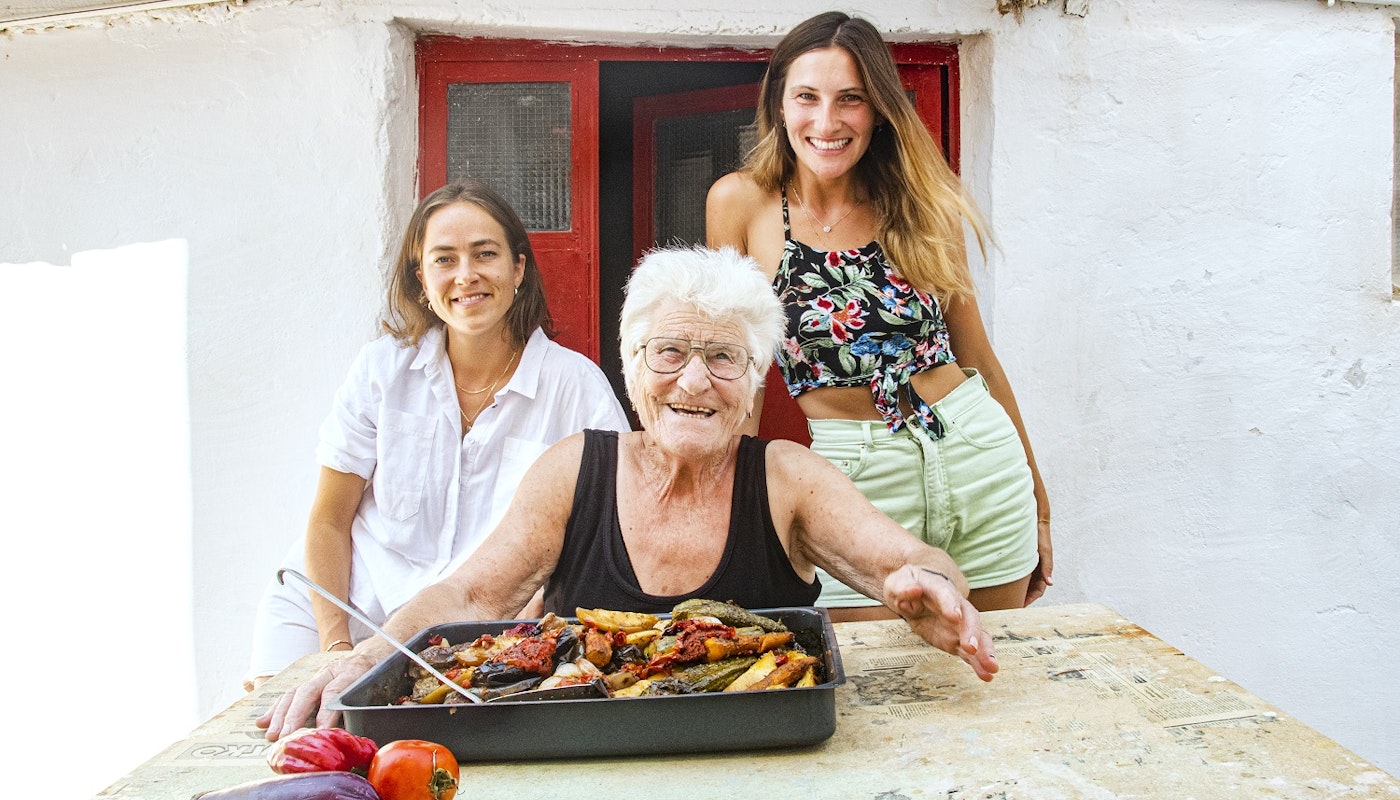And yet, to our grandparents, the notion is far from trend-led; it is just normal. That was just one of the abiding refrains that emerged when Iska Lupton and Anastasia Miari were researching Grand Dishes, a beautiful cookbook that records recipes from grannies of the world for posterity – along with their often hilarious, frequently moving and always inspiring stories.

The idea took root when Anastasia, attempting to record some of her Corfiot grandmother’s (or ‘yiayia’s’) recipes, had a lightning bolt of inspiration. When she outlined the concept to Iska, a university friend and a creative director working chiefly in food, the project swiftly got underway, with everyone they knew lining up to put forward their amazing grannies; subjects, it transpired, would not be in short supply. They won the gong for best blog at the Guild of Food Writers awards in 2018 and then tirelessly crowd-funded the ensuing book with Unbound; it came out in spring of this year.
But even as the project gained momentum, they could little have realised how much it would resonate when it hit the shelves – and nor that it would end up, rather surreally for them, being featured on the Drew Barrymore Show. But, as the book shows, food and the traditions around it, have the power to unite and to connect us to our past – and, if handed down, to our futures too. It is one of life’s universals.
Here, Iska and Anastasia share some of the stories – and the recipes – that they will be passing down through the generations.
Images: Ella Louise Sullivan

Congratulations to you both on Grand Dishes, which came out this spring. Can you tell us about the concept and how it came to you?
Iska: Anastasia wanted to record her Greek grandmother’s recipes so we began in Corfu, with Yiayia Anastasia. We went with our photographer friend Ella and cooked together and captured her portrait against her little white-washed house. Yiayia made sea bream, covered in lemon and oregano and cooked on an open flame, Greek salad and oregano chips all prepared in her outhouse kitchen. The photos and the portrait were remarkable and so we decided there was more to be done. We added the concept of collecting life stories – to give some context to the recipes and create a more rounded portrait of each grandmother – and then began the process. We began with Rajni in Leicestershire and then my German granny, Lally, in Exeter.

Once you floated the idea with friends, how easy was it to find the grannies you ended up featuring in the book?
Iska: We started the Instagram and began to put feelers out. People started to come back to say, ‘You have to cook with this granny here, who makes the most amazing xxx’. We’d have an initial phone call or cup of tea and a ginger biscuit to see whether it could work. We would need the recipe to connect somehow to the life story. Then we’d book in a day or weekend to cook and chat together.

You started the project as a blog, which won best blog at the Guild of Food Writers awards. Was that the moment you realised that the book, which you crowd-funded with Unbound, really had legs?
Anastasia: Yes! Although before that we won another prize from the Cointreau Creative Crew. Quite early on, after I’d had the initial idea to do the book, we entered a competition with the alcohol brand Cointreau to begin to realise the project. We won a trip to Angers, where the Cointreau distillery is and cooked with one of the first grandmothers there – Nicole, who made a Cointreau tart. Also, Ella Louise Sullivan’s photos really made us excited about what this could be.
Did you meet every single one of them? And what was it like travelling the world in search of recipes?
Iska: Yes, we cooked live with every granny. Sometimes it was a whole weekend, sometimes it was a day. Sometimes, the daughters and sisters and grandchildren were all there, and sometimes it was just us and the grandmother. It’s an extraordinary way to see the world and connect with a culture so quickly. From the tales of their history to their spice cupboards, we were immediately enveloped into their worlds. Every grandmother was so generous, with their time, their stories, their food. It’s definitely made us travel/holiday differently, with a kind of ‘access all areas’ mentality, knowing that the local people are the ultimate way to get a true reflection of a place. It’s mad, the cultural exchange that can be facilitated by a conversation.
Anastasia: Often I’d find a grandma on a press trip or, when we did our trip to America, I was asking everyone we’d meet, ‘Do you have a granny?’ What struck me most on the road was the willingness of people to invite us into their homes and divulge so much about their own lives. Meeting these women while travelling also gave an amazing perspective on each place we visited. It was like we had the ultimate tour guide for each region.

Were there any particularly funny stories that emerged as you started harvesting stories and recipes?
Anastasia: In terms of things that happened whilst on the granny mission, a very memorable moment was in Licata, Sicily, where we met Nonna Ciccina. Ella (the photographer) and I had woken at the crack of dawn to roll strozzapreti pasta with her and she spent hours preparing the dish. She was baking the big tray of Taiano pasta in a woodfired oven and kept going back to check on it. At one point, Ella and I followed her son-in-law to the pasta oven while Nonna took a break and he removed the tray from the oven and proceeded to drop all its content on the floor. It was a very funny moment but not so ha-ha for Nonna Ciccina who’d been awake since 5am preparing it! Thankfully, we had a spare veggie tray we’d made for Ella!
There were so many comedy moments but the funniest grandmas I think were definitely Anne and Harriet. Iska and I cooked with them in New Orleans and they were a sort of comedy double act, finishing each other’s sentences and faux-arguing about ways in which to cook a roux.
And heart-warming ones?
Anastasia: Iska’s grandmother, Lally, talked a lot about her husband when I interviewed her. There was a moment in which she described his death, how the nurse had listened for his heartbeat and then couldn’t find one. The way she described it – ‘that was like an explosion for me’ – was so powerful, it still makes my heart ache. She said if she could have one person over for dinner, it would be him.

I won’t ask who was the most memorable granny in the name of diplomacy – but can you mention a few who have really stayed with you?
Iska: Westelle in Nashville Tennessee was such a legend. So tiny and neat and groomed with cross-stitch wall hangings and family photos everywhere, a frilly bathroom and a giant American fridge that was bigger than her. She was so strong and so open about things she’d been through and relationships that had upset her – all while using a whisk from the 1980s to mix bran and buttermilk into muffins. She had a strong southern accent and posed in front of a giant American flag outside the house her husband had designed and built. Having given us her life story from start to finish she went rather quiet and thoughtful and said, ‘I’ve had a good life’ in a tone that made us both cry.
Anastasia: Eritrean grandmother Shewa really wowed me. She was very matter of fact about her time fleeing Eritrea for Sudan and walking through the desert for six months at the age of eighteen. She got lost and had to live with nomads and didn’t have a tent or a compass or much food or water. I asked her if she had ever been scared and she said, ‘No, I just kept thinking, tomorrow is another day and it will be better than today.’ I thought, ‘What an inspiring woman.’
Which are the recipes you’ve learned from the world’s grannies which have entered your repertoire – the ones you’ll be handing down to your grandchildren?
Iska: The caponata recipe is something I made every week for four months with the grandmother I worked with in Sicily, Dora. She was the smallest person with the biggest presence. She tasted and sniffed and seasoned again until it was perfect. There weren’t loads of ingredients available in the garden, but what there was (courgettes, aubergines, tomatoes) she treated so kindly and expertly, whether deep fried, roasted, breaded, doused in oil. The peppers, tomatoes and aubergines for the caponata were deep fried individually before their flavours merged in the same pan. I had a lot of caponata that summer but Dora’s was the best. So sticky and glorious with a varnish of olive oil – sweet, sour and salty in equal measure. Making this dish brings back four months of Sicilian adventures – many in Dora’s kitchen – so I won’t stop making it and recounting the stories.

Anastasia: I always wanted Yiayia’s seabream and skordalia recipe so I’m really glad I have that now. Other than Yiayia’s dishes, I’ve made Flora’s Croatian octopus salad so many times and there’s a magnificent chocolate cake recipe in there that wows everyone at dinner parties, every time now.
You cooked with grannies all over the world – what were the universal lessons that you learned about the role of food in our lives?
Iska: Food and food traditions are our legacy and the ultimate way of handing love and rituals down through the generations. Because of its multi-sensory nature, food can evoke memories with such power. Food makes people open up – we learnt this cooking side by side grannies around the world. Engrossed in the task of cooking, conversation flowed in the most intuitive way. Grandmother Gloria talked a lot about the therapeutic nature of cooking alongside family - the joy of quietly existing together in a task. We also learnt how the process of preparing food can be as significant as the final dish – from growing the vegetables or giving the beef hours and hours to slow cook. Cooking with time, dedication and love leads to the greatest flavours.
Anastasia: Life lessons were a huge part of what we gleaned from these woman and a central theme in the Grand Dishes book. Life is long and we shouldn’t sweat the small stuff. So much has happened to these women that our problems were water off a duck’s back to them. Not that they were insensitive, they just have a wisdom that is hard to possess at the age that we are now. We had advice from them that we wouldn’t expect to have from our peers. A big learning from me was the need to compromise in your expectations. No one has a perfect life, but that’s what makes life so remarkable.

The project is partly a time capsule, preserving recipes that might otherwise be lost for posterity. When learning from the grandmothers of the world, what did you observe about the way we cook has changed over the decades?
Anastasia:: We don’t cook local anymore and it’s something I’ve found increasingly worrying since writing the book and cooking with these women. For most of the grandmothers, it would be outrageous to cook with an ingredient that isn’t native to their own land. We have huge issues with sustainability now and it’s because we’ve moved away from the way our grandmothers cooked. Our food culture – as with most things – is about instant gratification now and ‘newness’. These grandmothers ate local, took the time to cook and also to perfect a small repertoire of dishes.
Iska: So many of the recipes the grandmothers taught us were handed down by their grandmothers. It made me realise that it’s special to have a few recipes that you know really well, that are an expression of your culture and experiences. We have such a wonderful array of recipe books out there now and could try something new every night. But making this book made me want to know a few recipes inside out – ones that might come to mean something to my family. I think also we’ve just sped up and we don’t take so much time to prepare and cook a meal from scratch. I think this is so important to hold onto, to stay connected to the food we make and be able to teach the next generation.

The zeitgeist happily places an onus on seasonality and local produce – though admittedly, we have a way to go. Do you think we’re coming full circle to the way our grannies cooked?
Iska: Definitely. We definitely noticed a faithfulness to what’s in season. For most of these ladies growing up, seasonality wasn’t a cool thing to do, it was the only way to go. Grandmothers know what’s seasonal because they lived by the food that was growing. They know that raspberries come in the summer and kale in the winter. I remember Tigger, our Hackney granny and (owner of a prized allotment), being quite shocked at the ‘always available’ produce wrapped in plastic in Tesco. I think the pandemic allowed people the time to really think about what they wanted to cook and then to take time preparing it – hence the sourdough bread revolution, which is actually the oldest technique.

How has each of your own grannies’ cooking shaped your lives and your memories of childhood?
Iska: My granny, Lally, is German and quite serious, though with a great wit. She wasn’t in love with cooking but loved that food would immediately unite the family. Every visit and every holiday revolved around food, from fish and chips on Devon beaches to apricot wheats at breakfast, hams and salads for lunch, marmite and cucumber on toast at tea time with a dainty cup of tea. Her bolognese was made with half pork and half beef mince, and no-one makes it like Lally. We’d have it in bowls made by her potter friend Bay, on spaghetti with mature cheddar grated on top, curly parsley from the pot outside the back door and green beans from the garden. Also her schnitzel, red cabbage and ‘granny carrots’ meal that’s in the book means a lot. Every one of these moments is so vivid and makes me much less terrified that she might ever not be with us anymore. She’s left us with the richest of traditions that I will keep recreating in her honour forever.
Anastasia: I think Yiayia’s cooking has always been intrinsically linked to her lifestyle. Her entire day revolves around what she is going to cook. In the same vein, I’m definitely a planner when it comes to mealtimes and I always know in advance what I’m cooking for lunch and dinner. Yiayia is on her own now but she will still cook for herself. It’s something I’ve always taken pleasure in too – taking the time to cook, even if it’s just me that’s eating. More than anything, Yiayia loves to see a plate licked clean and I have inherited this from her. I’m always the friend to host dinner parties and it’s because of this inherited need to feed.
Your book featured on the Drew Barrymore show in America. That must have felt momentous….
Anastasia: It’s very weird! At the time, I had Yiayia to the left of me complaining about needing to gut the fish she was planning on cooking for dinner and the show’s producers in my ears telling me, ‘Sorry, Jessica Alba is just running a bit late.’ The world of Hollywood colliding with my Yiayia’s little outhouse kitchen and alleyway was very surreal. What was so nice was the amount of interest from the Greek diaspora in the US – people messaging on Instagram to say that it reminded them of their own Yiayia. That was really heart-warming.
What other pinch-me moments has it brought?
Iska: We went to cook with Nona Flora in Croatia and spent two days taking dips in the sea between cooking barefoot in her house overlooking the sea. Flora had also arranged for us to meet Dagmar, a famous Croatian patron of the arts, on the island of Palmizana. A speed boat was sent and then a battered Land Rover met us on the island to drive us to Dagmar. Her family began importing cacti from Mexico and now the island is covered with exotic plants and cacti. Dagmar made an epic Gregada stew, with eight kinds of fish, covered in white wine and cooked in a heavy open pan on fire. We sat around the table with five other women, sharing their life lessons and anecdotes over very cold white wine.
Anastasia: The entire five-week road trip in America was really amazing. It’s such an overwhelming place and there were so many moments crammed into each day that each day felt like a week’s worth of action. I feel so privileged to have spent that time uncovering the food culture of the USA with the very best person I could have discovered it all with. A very special time of life filled with hilarity.

Will you continue to add grannies to the blog?
Anastasia: Yes! I have a whole Greek granny line up and I’m making plans for the directions in which the project will now move.
And finally, what’s next for each of you?
Anastasia: I’m working on book two, a podcast and of course, adding to the website and Instagram as I go along!
Iska: We are both enjoying the reactions to book one – especially from the families of the grannies that feature, which is very moving. Then I am handing over the granny baton to Anastasia who will continue on the mission and begin work on a second book. I will continue to approach grannies on my travels for a chat and to ask if I can pop into the kitchen to scribble a recipe down (it’s happened!).
By Nancy Alsop
July 2021
READ MORE
7 Great Pasta Recipes For Weeknight Dinners
9 Exceptionally Good Bread Recipes
9 Of The Best Spanish Tapas Recipes


